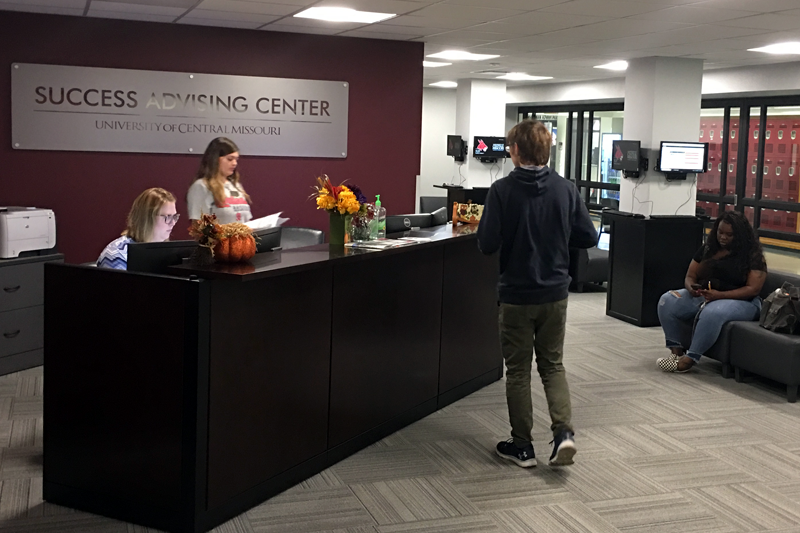Breadcrumb
Commitment to Student Success Leads to Record Retention at UCM
By Jeff Murphy, November 17, 2020

WARRENSBURG, MO - A commitment to helping students remain on track toward meeting
their education goals is showing positive results at the University of Central Missouri,
evidenced by fall 2020 census data. Retention of first-time, first- to second-year
students, a key quantitative measure of student success, is a record 74.8 percent.
Recent statistics released by the Office of Analytics and Institutional Research show a 1 percent increase in the retention of students who began their first year at UCM in the fall 2019 cohort and continued into the fall 2020 semester. This exceeds the previous record, a 73.8 percent retention rate, set by students in the fall 2018 cohort, and is almost 5 percent higher than the 2017 student cohort of 69.85 percent.
“Achieving record retention rates is truly a campus effort. I commend my colleagues and our students who embraced our comprehensive student success model,” said Phil Bridgmon, provost and vice president for Academic Affairs. “We are committed to further developing engaging academic and co-curricular experiences, coupled with individualized student support that will further advance student success. What distinguishes our campus is our deeply caring faculty and staff. They truly make the difference in achieving our goals and continuing our progress.”
While the experiences students gain in the classroom and the relationships they develop
with faculty members are vital to retention efforts, the university takes a team-like
approach to helping students through the educational pipeline. An important component
in this model is the Success Advising Center (SAC).
“Nobody comes to college with the intention of dropping out after a year, but people
do,” said Ken Schueller, SAC director.
Although students may leave campus for many reasons, he compared a student dropping out of college after beginning their education to an individual who buys a car, then gives it back to the dealer and keeps the payments.
“Nobody would do that,” he said, “but that is the essence of what dropping out of college is like.”
Schueller stressed the SAC’s main objective is to help students to define what success means to them. The SAC staff then determines what measures they can take to help students to move forward on their educational journey, helping them to establish a roadmap to their success.
“That is the key,” he said. “It’s not about getting numbers up, it’s about building a relationship with each student and figuring out how we get one step closer to their goals. We look at it as every student as a potential success story.”
The Success Advising Center, which serves students equitably and holistically, opened on the lower level of the Elliott Student Union in October 2018. It provides a cross-functional space with access to information, resources and services from trained success coaches and with opportunities vital to successful engagement in the university community. The initiative was part of the university’s $2.7 million grant from the U.S. Department of Education for Strengthening Institutions (SIP). The primary objective of this funding was to strengthen academic advising and support services to help students achieve their goals and to create a more robust first-year experience.
“Every student who comes here gets a success team,” Schueller said.
The SAC is comprised of 21 academic advisors, three senior advisors and 25 nationally certified peer educators who serve as success coaches. Students have the opportunity to interact with the success coaches and success advisors throughout their time at UCM, traditionally four years, to graduation. They engage with faculty mentors along the way, and at different times according to their academic program, but all students will have this opportunity by the time they are seniors.
“That’s really how this model works. We help everyone to transition in. That’s a heavy emphasis,” Schueller said.
Under the success model, first-year students will have at least six contacts a year with an SAC representative. The SAC continues to follow up with them in subsequent years to offer assistance as needed, but the first year, when the college experience is new, is most critical.
“During their first year, they will definitely see their success advisor and they will see their success coach. A success coach is a student who has already proven that they can succeed, and they have a desire to help others. They come from a lot of service areas on campus. They are students who have a propensity to want to help other people,” Schueller said.
The SAC staff has worked hard to assist students, even amid the unforeseen challenges
that emerged in early 2020. He pointed out that during the initial months of COVID-19,
when the campus began to operate remotely, this didn’t slow down the SAC’s efforts
to keep students on track for academic success.
“We basically found a way to continue our one-on-one interactions with students,”
Schueller said. “From the time we went remote to the time we all got back together
in June, we had more than 4,000 student appointments virtually to help keep them moving
forward.”
While SAC’s role is deeply ingrained in the success model, Schueller stressed the importance of faculty and staff interaction is vital. In fact, he said one Gallup poll stated that 64 percent of the time faculty are the most important factor in student retention. This is largely due to their ability to nurture student achievement, to make them feel welcome at UCM and confident in their ability to succeed.
“Everybody at UCM plays a role. As a student, I have to feel like I belong here,” Schueller said. “It’s a sense of belonging, a sense of connection, like being part of a family. If everybody in the family supports, loves and cares about you, you feel like you belong here.”
Learn more about the SAC at ucmo.edu/success.








